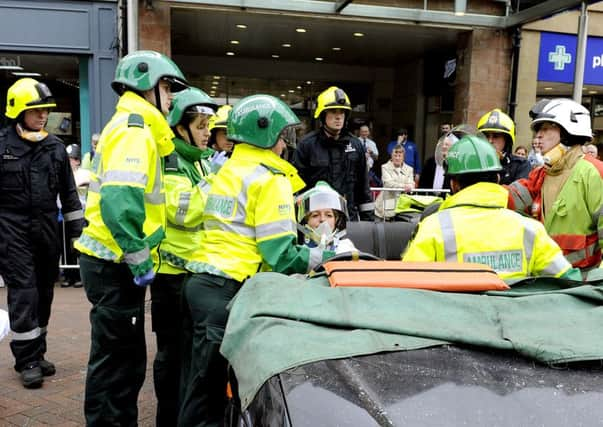Blue light workers seek an end to abuse from drunks


Police officers, paramedics and firefighters are being punched, threatened and spat on as they stand on the front line during emergencies.
Now, with the launch of a new campaign, the three blue light services have united to demand that it ends.
Advertisement
Hide AdAdvertisement
Hide AdA new staff survey reveals 999 workers report that alcohol misuse is a contributory factor in around half of incidents.
One in three have been subjected to physical abuse while attending an incident as a result of alcohol misuse and two thirds have experienced verbal abuse.
Assistant Chief Constable Mark Williams said: “The demands being placed on the emergency services by people who are drunk are huge.
“On many occasions, it delays police officers, firefighters and paramedics from getting to members of the public who really do need our protection and help.”
Advertisement
Hide AdAdvertisement
Hide AdAssistant Chief Officer David McGown of the Scottish Fire and Rescue Service added: “The public will be shocked to hear our frontline firefighters and control officers are often abused and obstructed by people under the influence of alcohol.
“They are all working to save lives and protect property. Being drunk is absolutely no excuse for impeding emergency responders or directing abuse at them. We are determined to get the message across – this is reckless, criminal behaviour that risks lives and it can never be tolerated.”
Daren Mochrie, the Director of Service Delivery for the Scottish Ambulance Service, said: “Crews are responding to alcohol related incidents every day of the week and at all times – it is no longer a weekend phenomenon.
Half of all incidents that 999 workers attended in the previous four weeks were alcohol related and almost two thirds of emergency personnel had faced difficulties obtaining urgent information because the victims or callers were drunk.
Advertisement
Hide AdAdvertisement
Hide AdOne firefighter said: “I was in breathing apparatus at a house fire and I found a man lying in his bed. He had tried to cook after coming back from a night out but he was drunk and fell asleep.
“The smoke alarm was blaring but he only woke up when I shook him to see if he was alive. He punched me in the face.”
An ambulance crew member said: “I have been assaulted, spat at and verbally abused too many times to mention.
“If people could only see the effect they have on an incident when they’re under the influence of alcohol. We have to spend as much time looking after our own safety as looking after our patient.”
Advertisement
Hide AdAdvertisement
Hide AdAlcohol Focus Scotland chief executive Alison Douglas said: “Our emergency services have to spend far too much time and resources dealing with the illness, injuries, disorder and violence caused by excessive drinking, often at risk to themselves.
“Reducing our overall alcohol consumption, with particular targeting of high risk groups, will help ease the pressure on our police, fire and ambulance staff.
“But encouraging people to drink less is difficult when we are surrounded by cheap alcohol that is constantly promoted as an everyday product.”